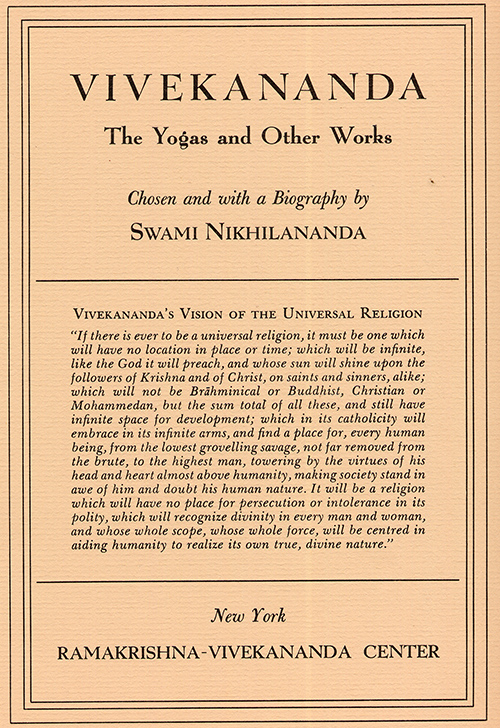
Yogas and Other Works
Swami Vivekananda. Chosen and with a biography by Swami Nikhilananda. Includes unabridged texts of "Jnana - Yoga," "Raja -Yoga," "Karma - Yoga," "Bhakti -Yoga," "Inspired Talks," Chicago Address. 18 other lectures, 8 poems and 70 letters. With 43 photographs.
Cloth: $44.95
From the Inside Flap
Swami Vivekananda (1863 - 1902), through his masterly exposition of the Hindu religion and philosophy at the Parliament of Religions held in Chicago in 1893, and his subsequent lectures and writings, made an unforgettable impression upon religious minds in America.
As the builder of the spiritual bridge joining East and West, he has been hailed as India's first cultural ambassador to the New World. For the past century Americans have been reading his Jnana-Yoga, Bhakti-Yoga, Karma-Yoga, Raja-Yoga, and other works to learn the techniques of the spiritual life, to gain an insight into the nature of spiritual experiences, and also to obtain an understanding of the Hindu religion and philosophy in general.
The materials contained in the present volume have been carefully selected from the eight volumes of Vivekananda's Complete Works published in India, and have been thoroughly revised and edited. They include, besides the unabridged texts of the Yogas, many of the Swami's other lectures, as well as poems and letters, and reveal Vivekananda as a philosopher, man of action, devotee of God, mystic, and poet.
The introductory section contains a detailed biography of Vivekananda by Swami Nikhilananda. Technical and unfamiliar words have been explained in an exhaustive glossary. The reader of this volume will find in Vivekananda not only an uncommon religious teacher, but also a warm-blooded, sensitive, passionate, and breathing human being. His words have power to stir up weary and depressed souls, strengthen men's faith in themselves and in God, and open new horizons before all seekers of truth.
Westerners will find here a key to understanding of the spiritual culture of the Orient and of India in particular. Through these teachings, which embody a synthesis of science and religion, reason and faith, modern minds will be enabled to deepen their religious consciousness and thus eventually realize the dream of One World.
Excerpted from Vivekananda : The Yogas and Other Works by Swami Nikhilananda. Copyright © 1953. Reprinted by permission. All rights reserved
Address At The Parliament Of Religions - Address At The Final Session (Chicago, September 27, 1893)
The World's Parliament of Religions has become an accomplished fact, and the merciful Father has helped those who labored to bring it into existence, and crowned with success their most unselfish labor.
My thanks to those noble souls whose large hearts and love of truth first dreamed this wonderful dream and then realized it. My thanks to the shower of liberal sentiments that has overflowed this platform. My thanks to this enlightened audience for their uniform kindness to me and for their appreciation of every thought that tends to smooth the friction of religions. A few jarring notes were heard from time to time in this harmony. My special thanks to them, for they have, by their striking contrast, made general harmony the sweeter.
Much has been said of the common ground of religious unity. I am not going just now to venture my own theory. But if any one here hopes that this unity will come by the triumph of any one of the religions and the destruction of the others, to him I say, "Brother, yours is an impossible hope." Do I wish that the Christian would become Hindu? God forbid. Do I wish that the Hindu or Buddhist would become Christian? God forbid.
The seed is put in the ground, and earth and air and water are placed around it. Does the seed become the earth, or the air, or the water? No. It becomes a plant. It develops after the law of its own growth, assimilates the air, the earth, and the water, converts them into plant substance, and grows into a plant.
Similar is the case with religion. The Christian is not to become a Hindu or a Buddhist, nor a Hindu or a Buddhist to become a Christian. But each must assimilate the spirit of the others and yet preserve his individuality and grow according to his own law of growth.
If the Parliament of Religions has shown anything to the world, it is this: It has proved to the world that holiness, purity and charity are not the exclusive possessions of any church in the world, and that every system has produced men and women of the most exalted character. In the face of this evidence, if anybody dreams of the exclusive survival of his own religion and the destruction of the others, I pity him from the bottom of my heart, and point out to him that upon the banner of every religion will soon be written in spite of resistance: "Help and not fight," "Assimilation and not Destruction," "Harmony and Peace and not Dissension."



